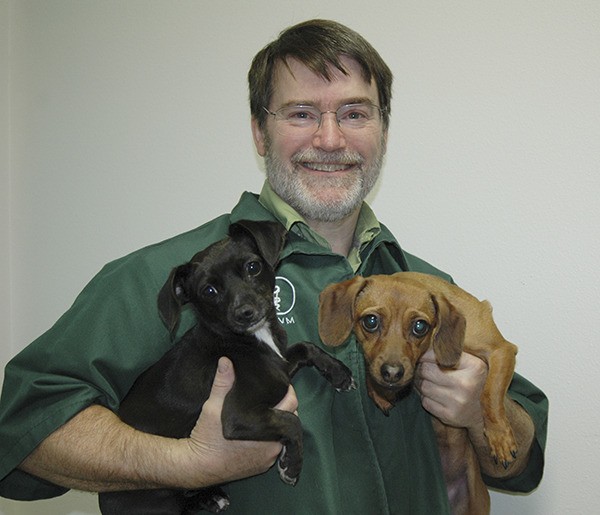Throughout the past 10 days veterinarian Mike Tyler has seen a surge in the number of appointments and calls related to coughing dogs.
“I would say the phone volume on this is several times what it normally is,” he said.
In reaction to what seems to be a local outbreak of respiratory infections among dogs, Tyler suggests dog owners take precautions within the next couple of weeks, or better yet through the holiday season. Precautionary measures include vaccinating and limiting both dog-to-dog contact and exposure to stressful situations.
“What we’re seeing is basically the equivalent of a human cold,” Tyler said. “It’s often referred to by the general term ‘kennel cough,’ but similar to how the human cold is the general term for hundreds of different types of colds that people can get — kennel cough doesn’t describe one type of infection either.”
Kennel cough is normally the result of more than one organism present, he said, and usually involves at least one virus and at least one bacteria.
Most puppies and adults are routinely vaccinated for two known viruses and often vaccinated against the bacterial illness Bordetella (kennel cough), but “unfortunately there are still other viruses and bacteria and other types of respiratory infections that occur,” Tyler said.
As founder of Greywolf Veterinary Hospital in 1992, Tyler has experienced many such outbreaks and doesn’t recognize the increase in respiratory infections as anything unusual as outbreaks can be “unpredictable and sporadic.” Unlike the occurrence, the spread of kennel cough is predictable through dog-to-dog respiratory contact; thus, Tyler suggests dog owners limit their dog’s interaction with other dogs and exposure to stressful environments.
A dog’s risks for infection increase at places like the dog park, boarding facilities, veterinary hospitals and dog shows, he said.
“If we can limit contact, then hopefully this will die down,” he said.
Dogs seen at Greywolf Veterinary Hospital for respiratory symptoms typically are first evaluated in the owner’s vehicle to avoid bringing the dog through the veterinary hospital.
More vulnerable populations of dogs, such as the very young, old, those with pre-existing respiratory conditions or breeds with respiratory limitations, can get kennel cough more severely and it can turn into pneumonia for instance, Tyler said. However, for most dogs kennel cough is self-limiting.
Although not every dog that gets a respiratory infection needs to be seen, Tyler does advise dog owners to always call to discuss their pet’s symptoms. By calling, veterinarians can try to determine whether the degree and/or durations of coughing warrants possible treatment.
“The classic sign is coughing, but with this type of cough, it’s often misinterpreted as gagging,” Tyler said.
Tyler doesn’t correlate the spike in respiratory infections with any one factor, but notes that sometimes outbreaks can coincide seasonally with the movement of animals — like in the springtime when snowbirds are returning.
“We also see it when animals start boarding more, which typically starts around this time of year,” he said.
Because dogs usually are boarded more throughout the holiday season, Tyler recommends all dogs receive a Bordetella vaccine prior to be boarded and dog owners ensure all other vaccinations are current.
Veterinarians at Sequim Animal Hospital also are reporting a recent increase among similar appointments and calls of concern.
Reach Alana Linderoth at alinderoth@sequimgazette.com.



